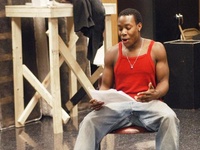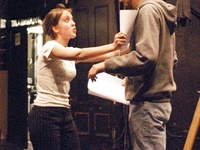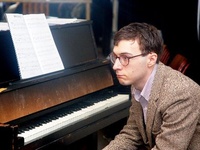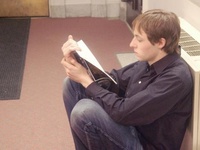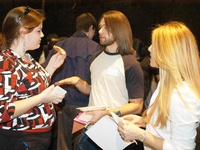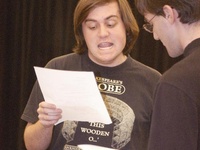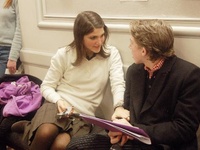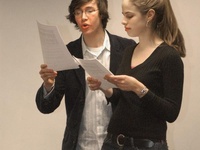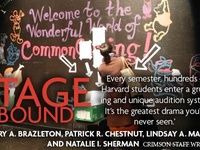Hanley says he’s satisfied with the cast he chose. He stresses the difficulty of making the final decisions. "Everybody that we called back was extremely talented," he sighs. "It literally came down to the beauty being in the details."
For Spillane-Hinks, callbacks are a hectic, but playful, process, as she enjoys testing various actor permutations. She often has actors perform a scene while "goaltending," an exercise in which one actor attempts to reach the wall while another tries to stop him.
Self-assured but still speaking gently, she gives the actors more pointed and direct notes. "I want you guys to settle more into your authority," she says to a pair. And she makes sure that actors properly understand the characters. "Widow Quinn never wonders whether she has the power of the situation," she tells one actress.
But after callbacks, Spillane-Hinks is forced to take a difficult step back and allow the actors to take control.
FINAL DECISIONS
Once directors have posted cast lists, they can only anxiously wait for actors’ calls and hope that those they cast accept their roles.
During this time, Spillane-Hinks turns to Practical Aesthetics, an acting technique based in Stoic philosophy. "You can’t control how you feel and you can’t control how other people feel, but you can control how hard you work," she says. "I sit down and I think about the play…I force myself to go back and work even further in analyzing the play and analyzing what each character is about."
The actors, however, already sold, need no more convincing it seems. Only two of her twelve first-choice actors turn their roles down—so they can take larger roles in other productions. Her past experience proves invaluable. "I was the most professional I’ve ever been in the process because I know how to best do it," she says.
First-round cast-lists go up, and Hanley thinks "Chicago" stands a good chance of winning over its leads because of the show’s natural appeal as well as its fast-moving production schedule.
"We’re gonna have an amazing cast," he says, but stops himself for a reality check. "If people accept. Hopefully everybody does."
Then, something astonishing happens. Every first-round lead accepts his or her part.
The news is good for actors as well. Walleck and Martin have received parts in both Mainstage productions, as well as a handful of other shows. They talk to directors and other actors to come to their final decision about which parts to take. Ultimately, both end up accepting the offered roles in "Playboy."
Unique factors complicate their decisions this semester. Martin’s thesis—on the plays of Aeschylus—is due in a month. Walleck has roles in two off-campus productions. And for both of them it is their last semester acting at Harvard.
"It was really, really difficult this semester," Walleck says, "I was not only taking into consideration what parts I liked but also that this was going to be my last non-professional production and the last chance to act with really my closest friends."
Polk hears "buzz" around the lists that the first-round pick for Richard II hasn’t accepted his part yet, and that he’ll refuse it. He then finds out that he’s the first alternate for the role.
Under the Common Casting system, roles are offered to a primary actor and multiple alternates; if the primary turns down the role during the 24-hour period between initial cast-list postings and final cast-list decisions, the first alternate has the opportunity to grab it.
The rumors turn out to be true. Phone calls are made, and all of a sudden, Polk goes from being virtually shut-out (he had received only one other role) to being on top.










